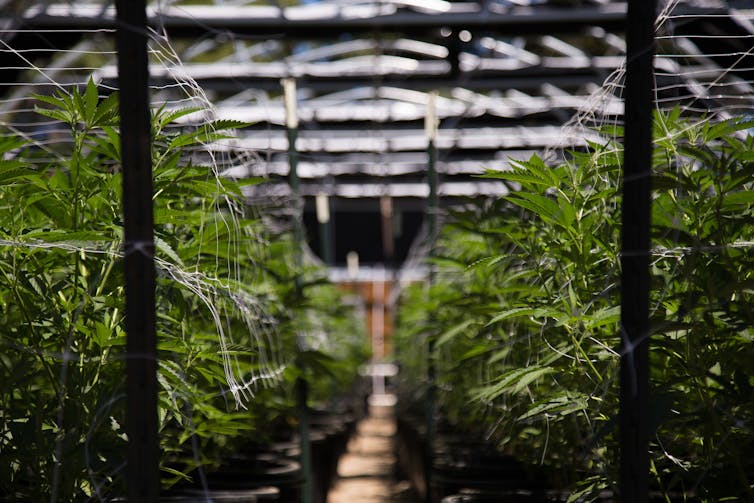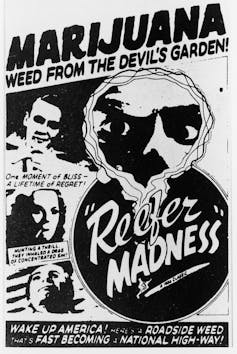
USA & CANADA (901)
Latest News
As cannabis is legalized, let’s remember amnesty
Wednesday, 24 October 2018 02:16 Written by theconversationWeed, spliff, cannabis, joint, blunt, Mary Jane, ganja, reefer, marijuana, pot: no matter what you call it, it is almost legal in Canada. Many will benefit from the new right to grow, sell or smoke legally and freely.
Before we celebrate, let’s take a moment to remember the Black and Indigenous peoples who have been overrepresented in Canada’s cannabis-related arrests, despite similar rates of cannabis use across racial groups. According to a 2017 Toronto Star report:
“Black people with no history of criminal convictions have been three times more likely to be arrested by Toronto police for possession of small amounts of marijuana than white people with similar backgrounds…”
A Vice report filed by Rachel Browne looked at statistics from 2015-17 and found that:
“Indigenous people in Regina were nearly nine times more likely to get arrested for cannabis possession than white people during that time period.”
The Cannabis Act (Bill C–45), informed by the recommendations of the Task Force on Cannabis, creates a legal framework for “controlling the production, distribution, sale and possession of cannabis in Canada.”

The act, however, does not discuss cannabis amnesty. Cannabis amnesty is the clearing or turning over of previous convictions of cannabis “crimes” that occurred before the legislation took effect.
Cannabis has a long history of being used to criminalize African, Indigenous and racialized peoples in Canada and globally. The lack of redress in Canada’s Bill C-45 for those convicted of marijuana charges indicates Canada’s continuation of these racist policies and processes.
While there are some critical discussions among African or Black scholars, lawyers and activists, the history of who has been criminalized has largely been ignored or silenced in the current legalization debates.
A continuum of colonial tragedies
Despite the absence of race in the legal debates, some media and academics have linked racism and the decriminalization of cannabis in Canada.
Robyn Maynard’s book Policing Black Lives: State Violence in Canada from Slavery to Presenteloquently discusses the historical and current realities of anti-Black racism (and Black resistance) through state-sanctioned violence. Maynard connects drug incarcerations with child incarcerations (in the form of Children Aids Society apprehensions) and other racist systemic practices that continue to harm mostly African and Indigenous families.
In addition to the Toronto Star and Vice reports, articles in the National Post and the Guardian question why the new legislation does not address past and more recent marijuana convictions and criminalization.
Other news stories that link racism to the criminalization of cannabis have come out of the CBC, Macleans and Now. But much more research and discussion about the impacts of both the criminalization and the decriminalization of cannabis on Black and Indigenous communities is needed.
There has been a deliberate campaign to criminalize racialized groups in Canada and the United States, and the criminalization of cannabis use has been part of this.
Many members of the Black and Indigenous communities feel outrage, anger and distress at the historically racist legislation. They now feel excluded from its possible resolution.
How long shall they kill our profits?
Despite a few good articles, the news media has mostly focused on the cannabis market.

Cannabis is a plant that has been used globally for thousands of years for spiritual, recreational and medicinal purposes. In many communities, cannabis is a cultural marker. For example, Rastafarian communities use cannabis in spiritual ceremonies.
The Cannabis Act does not specifically discuss the market possibilities of this gentrified industry, but the links between white male elites and the business of cannabis can already be seen. Now reports that while there are exceptions, “almost all of the country’s 80-plus licensed producers (LPs) are run by white men” and only “five per cent of board members of publicly traded weed companies in Canada are female.”
By focusing mainly on the money to be made from the “new legitimized” growers and sellers, these stories of potential success ignore the permeating racist ideology, structures and practices that were created to systematically steal resources (including people) from Indigenous communities globally. In the conversations about money, there are few discussions about reparations for past violence and diminished opportunities.
Evidence from the U.S. shows that in states where cannabis is legal, racialized folks continue to be arrested at higher rates than whites for weed possession.
Therefore, racialized people are still criminalized for cannabis, punished and isolated from their families and communities, leaving opportunities for big cannabis business in the hands of white elites.

Why Canada banned pot
The ban on drugs, including cannabis, in the early 20th century has links to racism and curtailed immigration. For example, the 1908 Opium Act and the 1923 Chinese Exclusion Act are both connected to anti-Asian sentiments, under the guise that opium would be brought by Chinese immigrants to “Canadian (white) youth.”
Emily Murphy’s 1922 book, The Black Candle helped to connect the fear of “the other” to cannabis. Soon after her book was published, cannabis was added to the restricted list of drugs in the 1923 Opium and Narcotic Drug Act. That act and the later Narcotics Control Act of 1961 led to marijuana convictions and incarcerations.
The Canadian state was built on Indigenous genocide and apartheid, sanctioned by the ruthless Indian Act and the viciousness of the “enslavement of African peoples” whereby enslavement “was a legal instrument that helped fuel colonial economic enterprise.” This history shaped the environment where Black and Indigenous peoples were deemed to be criminalized.
Marijuana legalized today: Racism here to stay?

Similarly, in the U.S., Mexican and Black people were blamed for cannabis use. These racist ideas were popularized by a 1936 propaganda film Reefer Madness, which spread racialized notions of the harm Black and Mexican users had on “good (white) folks.” The passage of the Boggs Act in the U.S. in 1952 set mandatory sentences for marijuana convictions.
For the cannabis movement to be truly effective, it must address amnesty, anti-Black racism and other intersectional violence inherent in our justice system. But history has taught us that colonial violence is insidious and continuous.
The lack of accessible race-based data on the criminalization of marijuana in Canada supports the theory that discussions of racial surveillance, profiling, carding and arrests that target Black and Indigenous communities have been silenced.
The redress of marijuana-related convictions on African/Black and Indigenous peoples are not emphasized in Bill C-45. Instead, the Cannabis Act expansively outlines the behaviour that is prohibited and punishable under the new legislation.
This emphasis ensures that the impact of cannabis amnesty will be limited and that Black, racialized and Indigenous communities will continue to face criminalization in Canada and globally, proving that old colonial rules, new elites and continuing violence still sanction the selling and use of cannabis.
We continue, however hopeless it sometimes feels, with the weight of thousands of ancestors behind us, resisting, persisting and demanding — for real freedom. This struggle includes the fight for amnesty for “crimes” from which others can now freely economically and socially benefit.
Author: Roberta K. Timothy Assistant Lecturer Global Health, Ethics and Human Rights School of Health, York University, Canada
Credit link:https://theconversation.com/as-cannabis-is-legalized-lets-remember-amnesty-103419<iframe src="https://counter.theconversation.com/content/103419/count.gif?distributor=republish-lightbox-advanced" width="1" height="1"></iframe>
My Nigerian degree was basically useless - Immigrant Tales with Peter Ademu-Eteh
Friday, 19 October 2018 00:52 Written by bellanaija It’s been over a year since I last posted anything. And that’s because I don’t like you people work has been so hectic, I’ve barely had time to breathe. I’ve also been working on a number of music projects and we spent the last year recording and shooting videos.
I’m switching the narrative from my funny experiences to something I think will be very useful to many readers out there. Since I last posted on BellaNaija, there’s been a huge surge in people applying to move to Canada. It’s really a good idea, if you’re prepared for life here. If you live in Nigeria, people make it sound like the moment you move abroad, people just hand you money, give you a house and car (and also stock your fridge for free). If you still believe in such fairytales, you really need to wake up.
Job Hunting in Toronto
In the Summer of 2015 I got bored with sitting around at home. I figured I could keep busy by picking up a part-time job. Or at least spice my resume with some Canadian experience.
It came as a shock to me that my Nigerian degree was basically useless because the jobs I wanted didn’t consider the fact I’m a trained lawyer. The jobs that would accept me didn’t care if I’d had any post-secondary education whatsoever. So I could be making exactly the same money as a 15 year old boy still in secondary school.
See my life!
I read an article that talked about how people often try up to 6 different career paths before settling in Canada. In my head I thought, at least I’ve tried Lawyer and Part-time Web Designer/Trouble-shooter/”the IT guy”. That article also said that most successful people in the corporate world had a background in sales.
I started looking for a job that:
(1) wouldn’t take me far from home,
(2) a job that gave me flexible hours so that even when school resumed I would be able to do a little work.
I applied for retail sales clerk positions in restaurants and grocery stores, but I also went for the big fish: managerial positions in small to medium-scale establishments (why can’t I dream?). The firms all seemed excited at my resume- you know, University Degree, Law School Degree and Masters Degree in progress. Also, that kinda turned out to be my undoing. In Canada, there really is such a thing as being “overqualified” for a job.
How I solved this problem
I read online that the solution to the “overqualified” and “under-experienced” quagmire is to get an entry-level job, preferably one that offers training and has opportunities to move round departments. That way, your experience can span a wide range and in future you could tailor your resume to reflect the relevant skills and experience. So, I applied to companies offering entry-level jobs. I found that most of them were either organizations that raised funds for charities; or companies that were simply looking for marketers.
Growing up in Nigeria made me hate the word “marketing”. It simply evokes images of people walking under the sun wearing branded T-shirts and hats and trying to convince pedestrians and even drivers to sample their products. Those same marketers that had no opportunities for advancement within their companies, were totally expendable and had base salaries of maybe 20,000 Naira per month ($60 CAD). I ignored the vacancies for marketing jobs and instead went for jobs that had customer relationship positions open.
None of the firms ever contacted me for a second interview. To be honest… I didn’t feel too bad. Looking back, I realize that I thoroughly enjoyed the experience of attending job interviews without feeling the pressure of I-need-this-job-or-I’ll-die. I once went as far as Burlington (about 150 km from where I live) to interview for a job. I put on a sharp suit, ironed my trousers (pants, Americans. Pants) till the gators (creases, Canadians, creases) were sharp enough to slice bread. The address they gave me was so confusing that I spent 2 hours walking under the sun till I found the place. When I got there, they told that the position was to advertise car polish at gas stations. I almost left in anger. Not only had I wasted my time and money, my phone was dead and it would take me another four hours to get back home because of the traffic.
Scammers Thrive in Canada too
One experience that hurt me was the time when several companies called to hire and sounded really excited about me but I had to tell them I was looking for a part-time position only. They were offering good compensation, to be honest. Some were too good to be true, like a company called Onemobius Consulting. I didn’t remember sending an application but they sent me an email offering me the post of operations manager, ready to start in two weeks, working full-time (8 am to 6 pm) for a basic salary of $50,000 per year; with medical, dental and transportation benefits. I was suspicious, because it seemed TOO easy.
Why I got suspicious
How would a company that had never met me in the flesh be willing to hire me without an interview? Or even a phone call? Why was their professional website so vague? (they said they offered financial services but never said exactly what they did). I started an email conversation with their head of HR and by the time they explained what the job was all about, I was convinced it was either a scam or a money laundering operation.
Essentially, my job would have been to deposit a large cheque in my account from my boss or a client, and then withdraw cash, then pay into other bank accounts. I was quite surprised because sending money in Canada is literally as easy as just emailing someone. I started asking questions- is this company registered under provincial (State) or Federal law? What’s the registered office? When can I come and see the physical location of the place?
My diligence saved my butt
Not surprisingly, the website disappeared a day or two after I started asking serious questions. I used web tools to check out the age of the website- curiously it wasn’t listed. It was registered by a person in the Czech Republic. The phone numbers given in the email simply responded with a “does not exist” prompt when I called. The phone number on the website turned was actually a number reported by thousands of people in the USA as a scam number. I felt lucky to have escaped this scam oh!
There was this call-center called Ememtel Solutions (Not real names). Their profile said they raised funds for some big-name cancer research companies and they wanted me to work for them. I immediately jumped at the opportunity. Big Mistake
Canada Doctors Wary Of Cannabis Legalisation
Tuesday, 16 October 2018 00:12 Written by guardian.ngCanada’s top medical journal warned Monday that the imminent legalization of cannabis for recreation use poses a major health concern despite broad support for ending the prohibition.
Diane Kelsall, editor in chief of the Canadian Medical Association Journal, called the October 17 launch “a national, uncontrolled experiment in which the profits of cannabis producers and tax revenues are squarely pitched against the health of Canadians.”
Any increase in pot use “should be viewed as a failure of this legislation” and convince Ottawa to amend the Cannabis Act, she wrote in an editorial in the journal’s online edition.
The government defends legalization as intended to get marijuana out of the hands of youths and beyond the control of drug lords.
The law has broad popular support, and has generated a booming marijuana industry in anticipation of full legalization, which goes into effect on Wednesday.
A survey published Monday found that 70 percent of Canadians support or accept pot legalization. Conducted in early September by Abacus Data, the survey has a 1.79 percent margin of error.
“Attitudes towards cannabis reflect the fact that a majority do not see it as any worse than consuming alcohol,” Abacus said in a statement.
But Kelsall warns that the hundreds of licensed growers that have popped up over the past year are driven by profit, and not concern over public health.
She points out that Health Canada, the country’s health ministry, estimates that pot legalization will cause a problem in one in three adults, and addiction in ten percent of users, with higher risks in youths.
“We cannot expect cannabis firms to restrict their growth ambitions or to have use reduction as a goal,” Kelsall said.
“Cannabis companies may initially focus on attracting current consumers from black-market sources, but eventually, to maintain or increase profits, new markets will be developed as is consistent with the usual behaviour of a for-profit company.”
Marketing efforts, she suggested, might include encouraging current users to use more, or attracting a younger demographic.
Trump vows “severe punishment” for Saudi Arabia if…
Saturday, 13 October 2018 21:53 Written by pmnewsU.S. President Donald Trump said in a CBS interview on Saturday that there would be “severe punishment” for Saudi Arabia if it turns out that missing Saudi journalist Jamal Khashoggi was killed in the Saudi consulate in Istanbul.
Khashoggi, a prominent critic of Riyadh and legal resident of the United States, disappeared on Oct. 2 after visiting the consulate.
“We’re going to get to the bottom of it and there will be severe punishment,” Trump said.
Asked whether Saudi Crown Prince Mohammed bin Salman gave an order to kill him, Trump said “nobody knows yet.
”But we’ll probably be able to find out.” Trump added in excerpts of the “60 Minutes” interview that will air on Sunday “we would be very upset and angry if that were the case”.
Trump said that there was much at stake with Khashoggi case, “maybe especially so” because he was a reporter.
But Trump signaled that cutting off U.S. military sales to the kingdom may not be an option, saying, “I don’t want to hurt jobs.”
Turkish sources have told the Media that the initial assessment of the police was that Khashoggi was deliberately killed inside the consulate.
Riyadh has dismissed the claims.
Popular News
Three Nigerian scammers bag 235-year imprisonment in America[PHOTOS]
Saturday, 13 October 2018 13:25 Written by dailypost.ngThree Nigerian scammers who befriended many of their victims on dating sites have been slammed huge prison sentences by a Mississippi court after making tens of millions of dollars from their schemes.
A court in the Southern District of Mississippi had in February found them all guilty of crimes including mail fraud, wire fraud, identity theft, credit card fraud and theft of government property. Ayelotan and Raheem were also found guilty of conspiracies to commit bank fraud and money laundering.
Dating back to at least 2001, the scammers were involved in multiple internet fraud schemes, resulting in losses in the tens of millions, according to the Department of Justice.
It claimed that they would befriend women on dating sites, establish a romantic relationship and then either get them to send money or have them participate in fraud schemes, usually without the victim’s knowledge.
The unsuspecting women would sometimes be required to cash counterfeit checks and money orders; use stolen credit card details to purchase goods; and use stolen personal information to take over victims’ bank accounts.
A whopping 21 defendants have already been charged in this ongoing case, 12 of whom have pleaded guilty to charges involving conspiracy and 11 of whom have been sentenced.
The three Nigerians were among the six extradited from South Africa by US Department of Justice in 2015 to face charges of running a series of scams against gullible Americans over the past 16 years.
Fourteen others resident in the US were also arrested to face trial in Gulfport, Mississippi on nine federal charges, including conspiracy to commit identity theft, wire fraud, bank fraud, theft of US government funds, and conspiracy to commit money laundering.
The indictment states that since 2001 the accused, were part of a string of scams against Americans, facilitated by internet communications. These include the longstanding 419 scheme, whereby a massive windfall is promised once a small number of payments have been provided, but the DoJ claims it went much further than that.
The team was also accused of running romance stings to bilk the lonely of funds, shipping fraud, running fake work-from-home businesses, check fraud, and plain-old hijacking of other people’s bank accounts and credit cards to divert funds.
Global fraud continues to grow thanks to the internet and an increase in the use of both anonymizing technology and bots designed to mimic human behavior.
ThreatMetrix, which analyzes 20 billion annual transactions, blocked 130 million fraud attempts in Q1 alone, a 35% increase on the same time last year.
However, it is Europe that has become a major fraud hotspot. There were 50% more fraud attempts originating from the region than the US in the quarter, the firm claimed.
NAN
US First Lady, Melania Trump Breaks Silence On Husband's Alleged Romance With Stormy Daniels
Friday, 12 October 2018 21:33 Written by tori.ng


Cosby is in jail while these big names accused of sexual misconduct are walking free
Friday, 28 September 2018 22:37 Written by face2faceafricaAmerican democracy is sick in the 21st century as justice has become the missing link in democratic processes involving sexual assault on women and racist attacks.
The United States has been hit by nume

The Cosby Show star had more than a dozen women accuse him of sexual misconduct going back almost 30 years, and one case made it to court which convicted him for the 2004 sexual assault of Andrea Constand.
The 81-year-old black man who rose to fame in the 1960s becoming the first black actor to star in a drama series fell into shame and in jail, for a crime he pled not guilty to, but had admitted in a 2005 document to “obtaining sedatives to give to young women he wanted to have sex with”.
Scapegoat?
Cosby is the first and only celebrity during the #MeToo era to be jailed after dozens of top celebrities were named by accusers who said they were sexually assaulted. President Donald Trump’s nominee for Supreme Court, Brett Kavanaugh, is currently under pressure after a professor Christine Blasey Ford alleged that in the early 1980s Kavanaugh had attempted to rape her.
Here are some big names who have been accused of sexual misconduct but are walking free.

Bill O’Reilly
Wealthy American journalist, author, and former television host Bill O’Reilly has been accused by at least six women of sexual harassment and threatening producers and guests to have sex with him or risk losing their careers if they refused him.
He is reported to have reached a legal settlements deal totalling a $45 million with the six women who were unsuccessful in court.
His misconduct was revealed in various New York Times investigations that resulted in his sack in 2017 by Fox News which was also implicated for helping him settle five sexual harassment lawsuits totalling $13 million.

Matt Lauer

Harvey Weinstein
American film producer Harvey Weinstein was the basis upon which the #MeToo movement started in 2017 after a report by the New York Times and The New Yorker claimed that dozens of women had accused him of rape, sexual assault and sexual abuse over at least 30 years.
Over 80 women have come out afterwards to accuse him of the acts which he denied. He was fired from his company, The Weinstein Company, and criminal complaints were filed by at least six women against him which resulted in his arrest in New York in 2018 and a subsequent rape charge and other offences. He was released on bail pending investigations.
He is also being investigated in the United Kingdom and other countries for the same allegations. Weinstein is walking free.

Russell Simmons
Hip-hop, fashion and entertainment mogul Russell Simmons was accused by model Keri Claussen Khalighi of coercing her to perform a sex act and later penetrating her without her consent in his New York apartment in 1991. He disputed her account, saying the relationship was consensual.
From that time to 2018, over half a dozen women have accused him of sexual misconduct, and six of them accused him of rape. The latest is 37-year-old filmmaker Jennifer Jarosik who accused him in January 2018 of rape and sexual assault.
She filed a lawsuit in California’s Central District Court, seeking $5 million in damages. Jarosik alleged that Simmons raped her in August 2016 after she was invited to his house in Los Angeles.
When Jarosik arrived, Simmons allegedly asked her to have sex with him, to which she allegedly said “no.”
“Simmons got aggressive and pushed Plaintiff [Jarosik] on his bed. Plaintiff tried to force Defendant to stay away from her and in doing so, Defendant knocked Plaintiff off his bed, and Plaintiff hit her head and then Defendant pounced on her while she was still in shock and fear, and proceeded to rape her,” says the lawsuit.
Simmons stated that he has “never had a sexual encounter that was not consensual or lawful — ever.”

TRUMP
The United States President Donald Trump has been the centre of sexual misconduct allegations made by at least 19 women since the 1980s.
He has been sued three times including a suit by his then-wife Ivana who made a rape claim during their 1989 divorce litigation. All the suits were withdrawn. Some of the allegations were public before his presidency and others came up during and after his campaign for office.
A 2005 audio recording that was leaked during the 2016 presidential campaign implicated Trump who was bragging that he “can do anything” to women. He can “just start kissing them … I don’t even wait” and “grab ’em by the pussy”. He denied behaving that way toward women and later threatened to sue all of his accusers.
Trump has also been accused by several former Miss USA and Miss Teen USA contestants of entering their dressing rooms in 1997, 2000, 2001, and 2006, while they were dressing up. He owned the Miss Universe franchise and had said in an interview in 2005 that he could “get away with things like that”.
Donald Trump is still the president of the United States and he has actively supported all the men accused of sexual misconduct in his government and blamed the victims and media of a political smear campaign.
Plane ditches into Pacific lagoon
Friday, 28 September 2018 10:56 Written by Punchng.com
Passengers were forced to swim for their lives Friday when an airliner ditched into a lagoon after missing the runway on a remote Pacific island and began sinking.
The Air Niugini Boeing 737-800 was attempting to land at Weno airport in Micronesia but ended up half submerged in Chuuk lagoon after the accident on Friday morning.
The airline said the plane, which was involved in a collision with another aircraft earlier this year, had “landed short of the runway”.
Remarkably, it reported no serious injuries among those on the plane, which was making a scheduled stop on its way from the Micronesian capital Pohnpei to Port Moresby.
“Air Niugini can confirm that all on board were able to safely evacuate the aircraft,” the firm said in a brief statement.
“The airline is making all efforts to ensure the safety and immediate needs of our passengers and crew.”
The airline did not detail what caused the accident, which occurred at about 9:30am (2330 GMT Thursday).
But it said it had been informed that “the weather was very poor with heavy rain and reduced visibility at the time of incident”.
Passenger Bill Jaynes, editor of the Pohnpei-based Kaselehlie Press newspaper said he did not even realise there had been an accident until he saw water gushing into the fuselage.
“It was surreal,” he told Bible Baptist Radio Chuuk shortly after being discharged from hospital with a gash on his forehead.
“I thought we landed hard until I looked over and saw a hole in the side of the plane and water coming in. I thought ‘this is not the way it’s supposed to happen’.”
Jaynes praised the response of the locals.
“They immediately starting coming out in boats. They were awesome and I was really impressed,” he said.
– Previous accident –
A witness told the media the plane approached the airport “very low” before hitting the water.
The runway, like others in the north Pacific, is relatively short at 1,831 metres (6,006 feet).
It is surrounded on three sides by water. The Chuuk lagoon was a famous World War II battle site and dozens of Japanese vessels and planes are on the lagoon floor, now a tourist attraction for scuba divers.
It is not the first time a plane has overshot the runway in Micronesia.
In 2008, an Asia Pacific Airlines cargo Boeing 727 overran and ended up with its nose landing gear in the lagoon at the end of the Pohnpei airport runway.
Papua New Guinea’s Accident Investigation Commission (AIC) said it was preparing to send investigators to Weno.
“We’re trying to arrange a team to go there but I cannot give you any more information because I simply don’t have it,” a spokesman told AFP.
Air Niugini is Papua New Guinea’s national airline and lists only one 737-800 among its fleet of 21 aircraft on its official website.
According to registration details supplied by the airline, the plane was built in 2005 and had previously been owned by Air India Express and Mumbai-based Jet Airways.
The AIC website details an incident involving the aircraft in May this year when a Hercules operated by a freight company clipped the 737’s wing while taxiing, causing “significant damage”.
The website said the accident is still under investigation.
(AFP)





